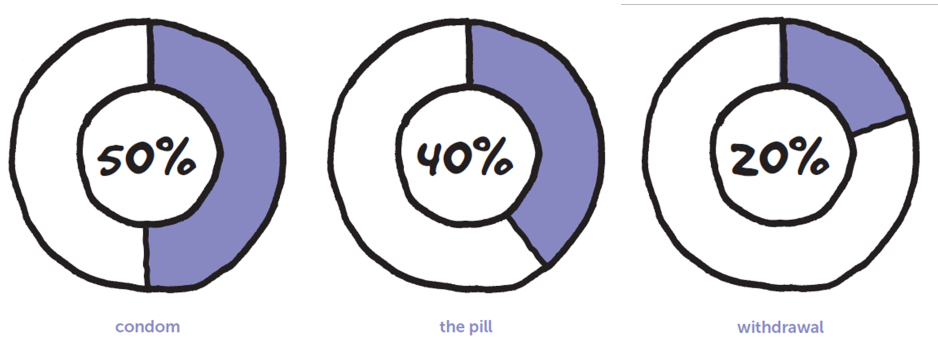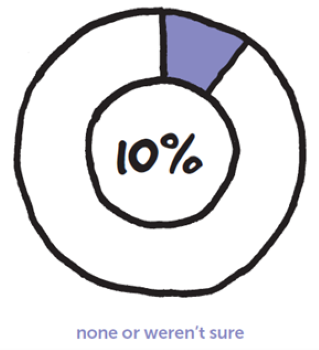Contraception

Reliable information
Every young person has a right to information that will help them keep safe and healthy, which includes information about avoiding unplanned pregnancy and STIs.
Part of a respectful sexual relationship involves being able to discuss contraception options with a sexual partner before having sex and being jointly responsible for preventing unplanned pregnancies (when having penis-in-vagina sex) and for preventing STIs.
What is contraception?
Contraception is something you do or use to prevent pregnancy.
If you have already had conversations with your child about how a pregnancy begins, it will make it easier for them to understand how contraception works.
A pregnancy begins when a sperm and egg join and then implant into the uterus (conception).
Contraception is something you do to stop the egg and sperm joining – which means there is no pregnancy.
Contraception options
There are a number of highly effective contraceptive options available for young people.
Here are some ways to explain some of the contraceptive options to your teen:
Condoms (external)
Condoms fit closely over an erect penis.
They collect semen and stop it from entering the vagina.
Condoms are highly effective if they are used correctly (which means putting it on and taking it off correctly and using water-based lubricants).
Condoms are the only form of contraception that protects against STIs.
They can be bought from chemists, supermarkets, vending machines in toilets and petrol stations.
There are also lots of sexual health services that provide them for free. You can find places that offer free condoms on the Get the Facts - find a free condom feature.
The Pill
The Pill contains hormones that stop the release of an egg from the ovaries.
It is taken every day at around the same time and is highly effective at preventing pregnancy.
It can also be used to control painful or heavy periods and improve acne.
The Pill allows someone to choose the timing of their period or to not have a period at all sometimes.
Missed or late pills, vomiting, diarrhoea and some medications can stop the Pill from working.
A prescription is needed from the doctor to get the Pill.
Implant ('The Rod')
An implant is a small plastic rod that a health professional inserts under a girl's skin (usually in the arm).
It slowly releases hormones that stop the release of an egg from the ovaries each month.
It is highly effective and lasts three years, but can be removed at any time by a health professional.
Intrauterine device (IUD)
An IUD is a small T-shaped device that is put into the uterus by a health professional.
There are two types – one that releases hormones and one that is made using copper.
Both stop the sperm from meeting with the egg.
Depending on which type you use, they last between 5 and 10 years, but can be removed at any time by a health professional.
Injection (Depo)
A health professional can give an injection with a hormone that stops the release of an egg from the ovaries each month.
These last 12 weeks so regular visits to the doctor or nurse are needed.
Emergency contraception
(sometimes call the 'morning after pill' or 'Plan B')
Emergency contraceptive pills (EC) are used to reduce the risk of pregnancy after penis-in-vagina sex has occurred without the use of contraception or when contraception has failed (e.g. a broken condom).
There are different types of EC but work by delaying the egg from being released.
It is most effective the sooner it is taken but can be effective for up to 4 or 5 days after sex (depending on which type of EC is used). This is important as some people think they have to wait until the following morning to get EC.
They do not cause an abortion.
EC is available over the counter at most pharmacies and sexual health clinics.
They do not need a prescription but the chemist will need to ask some questions to make sure the right medication is given.

My friend's daughter has just had 'the rod' fitted.
What have you heard about 'the rod'?
Some WA stats
In a survey of Western Australian Year 10 to 12 students,
these were the following most common methods of contraception for sexually active teens in their most recent vaginal sex experience 10:

Very few teens used no contraception or weren't sure about the type of contraceptive used10:

Some reasons young people give for not using condoms include:
- I know my partner's sexual history
- I trust my partner
- It just happened
- My partner doesn't like them
- I don't like them.
Young people report some barriers to getting prescribed contraception including embarrassment in discussing their sexual health, concerns around confidentiality and expense.23
Show your teen how to get their own Medicare card at age 15 and encourage them to speak to their doctor or to phone the Sexual Health Helpline to help them decide which contraception is best for them.
Facts young people need to know
If young people are going to have penis-in-vagina sex, there are some facts they need to know:
- A girl can get pregnant the first time she has sex.
- A girl can get pregnant even when she has her period (or has just finished it).
- Sperm can stay alive in a girl's body for up to five days after sex.
- 'Pulling out' (withdrawal method) is not a very effective form of contraception – sperm can be present in the 'pre-cum' (and it doesn't protect against STIs).
- Not having any sexual activity where sperm can come in contact with the vagina (abstinence) is the only 100% effective method of avoiding pregnancy.
- Condoms are the only form of contraception that protects against getting or passing on most STIs.
- If young people are going to have sexual intercourse, using a condom and a long-acting reversible contraceptive (LARC) at the same time offers the best protection from unplanned pregnancies and STIs.
- LARCs are fit and forget' contraceptive methods – they last a long time and young people don't have to remember to take or use them (e.g. 'the rod' and IUDs).
- Doctors and sexual health clinics can help young people to decide the best contraception for them, answer any questions they have, and offer them STI checks.
- Many services are free or low cost for young people.
Read next:
If you need support:
Sexual Health Helpline, Free confidential answers to questions by phone or email.
Sexual Health Quarters, Free and low cost confidential and non-judgemental sexual health services. Youth-friendly services include STI testing and treatment; contraception information and supply; unplanned pregnancy information and referral; counselling (free for unplanned pregnancy issues and those under 25).
You might also be interested in:
Safer sex resources, Growing and developing healthy relationships